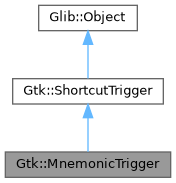A Gtk::ShortcutTrigger that triggers when a specific mnemonic is pressed. More...
#include <gtkmm/shortcuttrigger.h>

Public Member Functions | |
| MnemonicTrigger (MnemonicTrigger &&src) noexcept | |
| MnemonicTrigger & | operator= (MnemonicTrigger &&src) noexcept |
| ~MnemonicTrigger () noexcept override | |
| GtkMnemonicTrigger * | gobj () |
| Provides access to the underlying C GObject. | |
| const GtkMnemonicTrigger * | gobj () const |
| Provides access to the underlying C GObject. | |
| GtkMnemonicTrigger * | gobj_copy () |
| Provides access to the underlying C instance. The caller is responsible for unrefing it. Use when directly setting fields in structs. | |
| guint | get_keyval () const |
| Gets the keyval that must be pressed to succeed triggering self. | |
| Glib::PropertyProxy_ReadOnly< guint > | property_keyval () const |
| The key value for the trigger. | |
 Public Member Functions inherited from Gtk::ShortcutTrigger Public Member Functions inherited from Gtk::ShortcutTrigger | |
| ShortcutTrigger (ShortcutTrigger &&src) noexcept | |
| ShortcutTrigger & | operator= (ShortcutTrigger &&src) noexcept |
| ~ShortcutTrigger () noexcept override | |
| GtkShortcutTrigger * | gobj () |
| Provides access to the underlying C GObject. | |
| const GtkShortcutTrigger * | gobj () const |
| Provides access to the underlying C GObject. | |
| GtkShortcutTrigger * | gobj_copy () |
| Provides access to the underlying C instance. The caller is responsible for unrefing it. Use when directly setting fields in structs. | |
| Glib::ustring | to_string () const |
| Prints the given trigger into a human-readable string. | |
| Glib::ustring | to_label (const Glib::RefPtr< const Gdk::Display > &display) const |
| Gets textual representation for the given trigger. | |
| bool | equal (const Glib::RefPtr< const ShortcutTrigger > &trigger2) const |
| Checks if trigger1 and trigger2 trigger under the same conditions. | |
| int | compare (const Glib::RefPtr< const ShortcutTrigger > &trigger2) const |
The types of trigger1 and trigger2 are gconstpointer only to allow use of this function as a CompareFunc. | |
| Gdk::KeyMatch | trigger (const Glib::RefPtr< const Gdk::Event > & event, bool enable_mnemonics) const |
| Checks if the given event triggers self. | |
Static Public Member Functions | |
| static GType | get_type () |
| Get the GType for this class, for use with the underlying GObject type system. | |
| static Glib::RefPtr< MnemonicTrigger > | create (guint keyval) |
 Static Public Member Functions inherited from Gtk::ShortcutTrigger Static Public Member Functions inherited from Gtk::ShortcutTrigger | |
| static GType | get_type () |
| Get the GType for this class, for use with the underlying GObject type system. | |
| static Glib::RefPtr< ShortcutTrigger > | parse_string (const Glib::ustring &string) |
| Tries to parse the given string into a trigger. | |
Protected Member Functions | |
| MnemonicTrigger (guint keyval) | |
 Protected Member Functions inherited from Gtk::ShortcutTrigger Protected Member Functions inherited from Gtk::ShortcutTrigger | |
| ShortcutTrigger () | |
Related Symbols | |
(Note that these are not member symbols.) | |
| Glib::RefPtr< Gtk::MnemonicTrigger > | wrap (GtkMnemonicTrigger *object, bool take_copy=false) |
| A Glib::wrap() method for this object. | |
 Related Symbols inherited from Gtk::ShortcutTrigger Related Symbols inherited from Gtk::ShortcutTrigger | |
| Glib::RefPtr< Gtk::ShortcutTrigger > | wrap (GtkShortcutTrigger *object, bool take_copy=false) |
| A Glib::wrap() method for this object. | |
Detailed Description
A Gtk::ShortcutTrigger that triggers when a specific mnemonic is pressed.
Key values are the codes which are sent whenever a key is pressed or released. The complete list of key values can be found in the gdk/gdkkeysyms.h header file. They are prefixed with GDK_KEY_.
Constructor & Destructor Documentation
◆ MnemonicTrigger() [1/2]
|
noexcept |
◆ ~MnemonicTrigger()
|
overridenoexcept |
◆ MnemonicTrigger() [2/2]
|
explicitprotected |
Member Function Documentation
◆ create()
|
static |
◆ get_keyval()
| guint Gtk::MnemonicTrigger::get_keyval | ( | ) | const |
Gets the keyval that must be pressed to succeed triggering self.
- Returns
- The keyval.
◆ get_type()
|
static |
Get the GType for this class, for use with the underlying GObject type system.
◆ gobj() [1/2]
|
inline |
Provides access to the underlying C GObject.
◆ gobj() [2/2]
|
inline |
Provides access to the underlying C GObject.
◆ gobj_copy()
| GtkMnemonicTrigger * Gtk::MnemonicTrigger::gobj_copy | ( | ) |
Provides access to the underlying C instance. The caller is responsible for unrefing it. Use when directly setting fields in structs.
◆ operator=()
|
noexcept |
◆ property_keyval()
| Glib::PropertyProxy_ReadOnly< guint > Gtk::MnemonicTrigger::property_keyval | ( | ) | const |
The key value for the trigger.
Default value: 0
- Returns
- A PropertyProxy_ReadOnly that allows you to get the value of the property, or receive notification when the value of the property changes.
Friends And Related Symbol Documentation
◆ wrap()
|
related |
A Glib::wrap() method for this object.
- Parameters
-
object The C instance. take_copy False if the result should take ownership of the C instance. True if it should take a new copy or ref.
- Returns
- A C++ instance that wraps this C instance.